The Hindu Editorial (Shuffling the deck) – Jul 24, 2024
To read this article, click “The Hindu”.
This preview is provided here with permission.
Courtesy: The Hindu
The Hindu Editorial (Shuffling the deck) – Jul 24, 2024:
- shuffle the deck (phrase) – randomize one’s available options; use one’s available resources differently.
- deck (noun) – a pack of playing cards.
- sought past and past participle of seek (verb) – search for, try to find, look for, look around for, be in quest of.
- fiscal (adjective) – relating to government money or public money, especially taxes; financial, monetary.
- fiscal responsibility (noun) – the act of creating, optimizing and maintaining a balanced budget.
- distinct (adjective) – clear, well defined, definite, obvious, apparent, striking, noticeable, palpable.
- angst-ridden (adjective) – filled with a feeling of dread or anxiety, fear, dread or worry.
- angst (noun) – anxiety, fear, dread, fearfulness, distress, worry, apprehension, nervousness, tension.
- ridden (adjective) – full of; filled with (something unpleasant or bad).
- loud and clear (phrase) – very clearly; in a way that is easy to understand.
- suffer (verb) – experience, undergo, receive, go through, face, encounter.
- reverse (noun) – setback, upset, disappointment, blow, hardship.
- in the face of (phrase) – despite, notwithstanding, regardless of; when confronted with.
- concerted (adjective) – involving a lot of people coming together & doing something with great effort; strenuous, vigorous, energetic, determined, active, intense; coordinated, collaborative, collective, combined, joint.
- campaign (noun) – canvassing, electioneering, an act of soliciting (asking for/requesting) votes; an organized effort that seeks to influence the decision-making progress within a specific group.
- spotlight (verb) – focus attention on, highlight, draw attention to, underline, underscore.
- agitate (verb) – upset, distress, disturb, concern, trouble, bother, worry.
- palpable (adjective) – visible, noticeable, perceivable, tangible, observable, discernible, obvious, evident, apparent.
- lack (noun) – shortage, deficiency, unavailability, deficit.
- keen (adjective) – eager, desirous, intent on, interested in, fond of.
- redress (noun) – rectify, correct, set right, amend, sort out, deal with, remedy.
- slew (noun) – a large number of, lot, range.
- assert (verb) – state, announce, affirm, insist, claim strongly.
- stress (verb) – emphasize, draw attention to, focus attention on, underline, underscore, highlight, point up.
- lay emphasis on (phrase) – to emphasize the importance/value of something; stress, highlight, underline, underscore, accentuate, point up.
- skilling (noun) – it represents all types of continuous learning/training to help build high-demand skills.
- Micro, Small and Medium Enterprise (MSME) (noun) – MSME stands for Micro, Small and Medium Enterprise (MSME), introduced by Government of India in agreement with Micro, Small & Medium Enterprises Development (MSMED) Act, 2006. It includes Enterprises engaged in the manufacture or production, processing or preservation of goods & Enterprises engaged in providing or rendering of services with some specific requirements.
- with a view of (phrase) – with the aim of doing something.
- facilitate (verb) – assist, help, aid, ease, make easy, make possible.
- outlay (noun) – expenditure, expenses, spending, outgoings, money spent.
- centrepiece (noun) – backbone, foundation, key player, mainstay, central component, cornerstone.
- wage (noun) – payment, salary, stipend, allowance.
- subsidy (noun) – also called as subvention; a financial contribution granted to help an industry or business, mostly given by a government, in order to keep the price of service/goods at a low level.
- workforce (noun) – the group of individuals who are employed; staff, employees, personnel.
- formal sector/organized sector (noun) – formal economy; it is the part of an economy that is taxed, or monitored by any form of government.
- informal/unorganized sector (noun) – informal economy, grey economy; it is the part of an economy that is neither taxed nor monitored by any form of government.
- entail (verb) – require, demand, call for, make necessary.
- Employees’ Provident Fund Organisation (EPFO) (noun) – The Employees Provident Fund Organisation (EPFO) is a statuary body which assists Central Board in administering compulsory contributory Provident Fund Scheme, Pension Scheme and Insurance Scheme for the workforce engaged in the organised sector in India. EPFO is one of the World’s largest Social Security Organisations in terms of clientele and the volume of financial transactions undertaken.
- subject to (adjective) – conditional on, dependent on, bound by, answerable to, accountable to, liable to.
- cap (noun) – limit, upper limit, ceiling.
- caveat (noun) – warning/caution of provision, condition, clause.
- incentive (noun) – rewards (monetary or non-monetary) given to motivate and encourage people to perform better; encouragement, enticement, impetus, motivation, stimulus, reason/motive, attraction.
- in concert with (phrase) – together, jointly, in collaboration, in cooperation.
- leverage (verb) – use, capitalize on, exploit, milk, cash in on.
- employability (noun) – a person’s capability for gaining and maintaining employment.
- quiver (noun) – (figuratively) a number of resources or strategies; Literally, quiver is an archer’s portable case for holding arrows.
- predictably (adverb) – as expected.
- under the aegis/auspices of (phrase) – with the support/help/protection of someone/something; backing, patronage, sponsorship, guidance, assistance, influence, responsibility, care.
- mirror (verb) – reflect, repeat, match, reproduce, imitate.
- manifesto (noun) – (policy) statement, declaration, pronouncement.
- bear (verb) – absorb, support, take on, carry, handle, incur.
- allowance (noun) – payment, financial support, stipend.
- Corporate Social Responsibility (CSR) (noun) – the ethical role of the corporation (private business) in society. It ensures that the company spends, in every financial year, at least two per cent of the average net profits of the company made during the three immediately preceding financial years, in pursuance of its Corporate Social Responsibility Policy.
- potentially (adverb) – likely, probably, possibly, certainly, may be.
- exposure (noun) – introduction, awareness, acquaintance, experience, familiarity.
- weigh against (phrasal verb) – analyze, compare, correlate, juxtapose; place side by side; compare with, place against another.
- backdrop (noun) – circumstance, condition, situation, context, background.
- the fact that (phrase) – used to refer to a specific situation under consideration/discussion.
- Chief Economic Adviser (CEA) (noun) – The Chief Economic Adviser to the Government of India (CEA) is responsible for providing fresh ideas to bolster growth, investments and limiting fiscal deficit. In his/her role, he/she would be required to share views on key policy matters with the finance minister as well as being the lead author of the Economic Survey, which is the annual report card of the economy that gets tabled in Parliament ahead of the budget.
- highlight (verb) – emphasis, underscore, underline, accentuate, point up
- Economic Survey (noun) – Economic Survey, being presented in the Parliament ahead of the Union Budget, is the Ministry of Finance’s flagship document. The Economic Survey details information about the Indian economy over the past year. The Economic Survey also offers glimpses into the current state of the economy, and occasional insights into the economic outlook. Although the Constitution does not bind (impose a legal obligation on) the government to present the Economic Survey, over the years, it has become common practice for every government to present the Economic Survey before the Union Budget.
- largely (adverb) – mostly, mainly, generally.
- absorb (verb) – take in, include, subsume.
- acknowledgment (noun) – acceptance, admission, recognition, realization, approval.
- primacy (noun) – greater importance, priority, preference.
- sought past and past participle of seek (verb) – try, aim, attempt.
- quell (verb) – put an end to, quash, suppress, abolish, demolish, finish/end; silence, mitigate.
- strident (adjective) – harsh, vocal, vociferous, forceful.
- charge (noun) – accusation, allegation, indictment.
- cosy (adjective) – intimate; friendly, relaxed, comfortable.
- concerted (adjective) – involving a lot of people coming together & doing something with great effort; strenuous, vigorous, energetic, determined, active, intense; coordinated, collaborative, collective, combined, joint.
- bid (noun) – attempt, try, effort.
- address (verb) – tackle, deal with, attend to, try to sort out.
- lynchpin (noun as modifier) – most important, main, focal, central (thing).
- credit guarantee (scheme/fund) (noun) – a type of scheme/fund (by the government) which backs up the loan taken by the beneficiaries as a form of collateral (pledged as security/guarantee).
- collateral (noun) – a tangible or intangible asset that a borrower pledges to a lender to secure a loan; security, surety, guaranty, guarantee.
- tailor (verb) – customize, adapt, adjust, modify, change.
- debt financing (noun) – a form of business finance that involves a company borrowing money from a financer, like a bank or working capital funding organization. (or) Debt financing is taking out a loan.
- working capital (noun) – The capital required by a business or venture to meet its day-to-day expenses is known as the working capital. It is the amount of cash and other current assets a business has available after all its current liabilities are accounted for.
- potential (adjective) – possible, likely, prospective, probable.
- pool (noun) – group.
- Public Sector Enterprise/Public Sector Undertaking (PSU) (noun) – Companies owned by the Union Governmentof India or one of the many state or territorial governments or both together in parts. The company stock is majority-owned by the government in a PSU.
- outcome (noun) – end result, aftermath, conclusion, consequence, effect.
- regime (noun) – system.
- rationalise (verb) – modernise, streamline, make more efficient, hone, simplify, reorganize.
- given (preposition) – considering, taking into account, bearing in mind.
- encounter (verb) – face, be faced with, experience, come across.
- entice (verb) – convince, attract, woo, lure, persuade, tempt.
- wholeheartedly (adverb) – committedly, dedicatedly, enthusiastically.
- embrace (verb) – accept, approve, ratify, validate.
- slab (noun) – category, group. stage, level.
- so as to (phrase) – in order to.
- stick to (verb) – abide by, adhere to, hold to, keep to, stand by.
- fiscal consolidation (noun) – it is a reduction in the underlying (basic) fiscal deficit and public debt.
- fiscal deficit (noun) – the difference between total expenditure and total income of the government.
- pare (verb) – reduce, diminish, decrease.
- Gross domestic product (GDP) (noun) – a measure of economic activity in a country. It is the total value of a country’s annual output of goods and service.
- set about (phrasal verb) – to begin to do with something; to start to deal with something.
- egregious (adjective) – shocking, horrible/terrible, very bad.
- Mahatma Gandhi National Rural Employment Guarantee Act/Scheme (MGNREGA), 2005 (noun) – an Indian labour law and social security measure that aims to guarantee the ‘right to work’. It aims to enhance livelihood security in rural areas by providing at least 100 days of wage employment in a financial year to every household whose adult members volunteer to do unskilled manual work.
- Budget Estimates (BE) (noun) – Amount of money allocated in the Budget to any ministry or scheme for the coming financial year.
- peg (at) (verb) – fix, set, hold, limit (a price, rate, or amount) at a particular level.
- Revised Estimates (RE) (noun) – Revised Estimates are mid-year review of possible expenditure, taking into account the rest of expenditure, New Services and New instrument of Services etc.
- across the board (phrase) – applying to all.
- glaring (adjective) – obvious, striking, blatant, flagrant.
- whatsoever (adjective) – whatever, any.
- compulsion (noun) – pressure, intimidation, constraint, obligation.
- result in (verb) – cause, lead to, bring about, give rise to.
- all told (phrase) – in total.
Note :
1. Click each one of the words above for their definition, more synonyms, pronunciation, example sentences, phrases, derivatives, origin and etc. from http://www.oxforddictionaries.com/.
2. Definitions (elementary level) & Synonyms provided for the words above are my personal work and not that of Oxford University Press. Tentative definitions/meanings are provided for study purposes only and they may vary in a different context.
3. This word list is for personal use only. Reproduction in any format and/or Commercial use of it is/are strictly prohibited.
The Hindu Editorial (Shuffling the deck) – Jul 24, 2024:
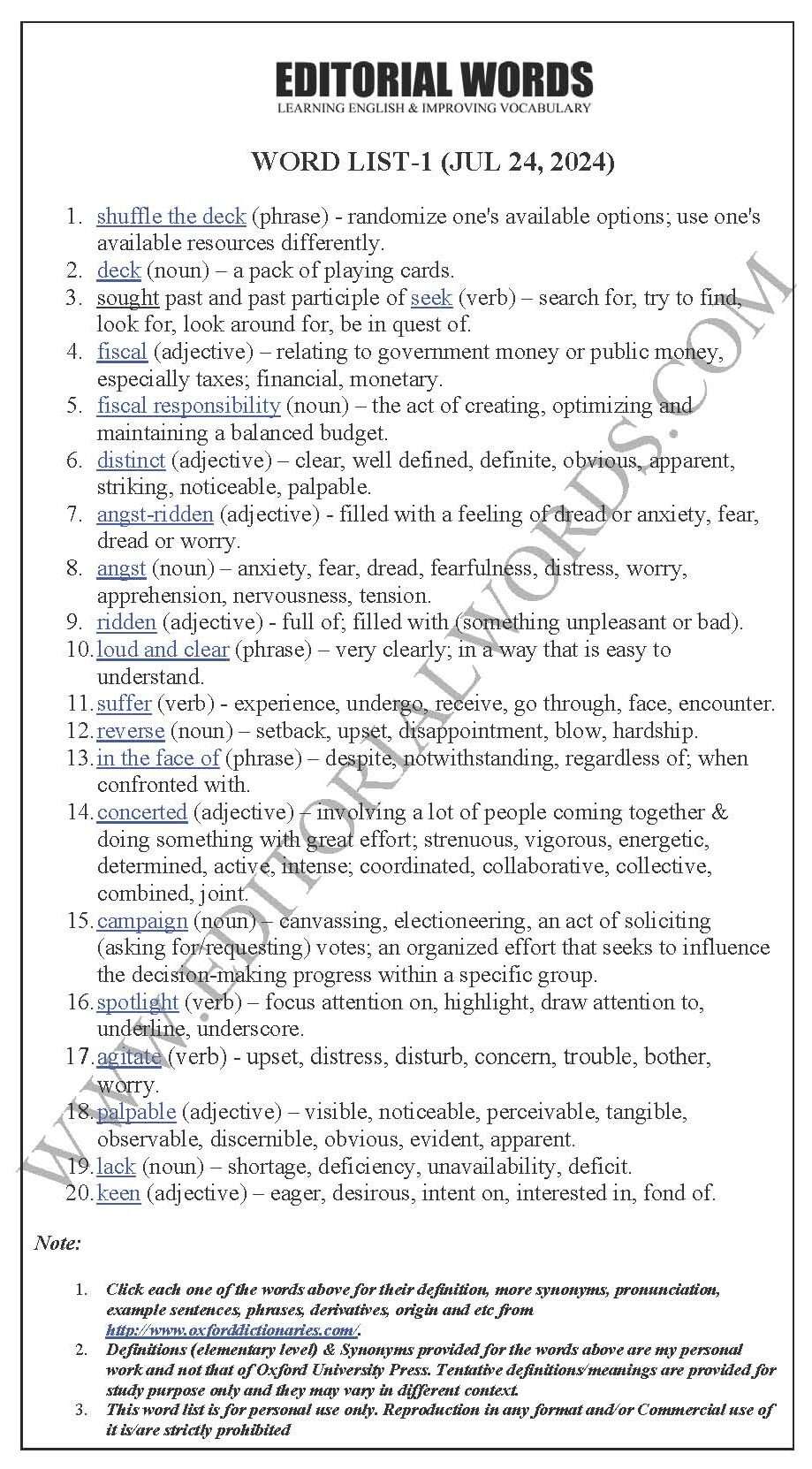
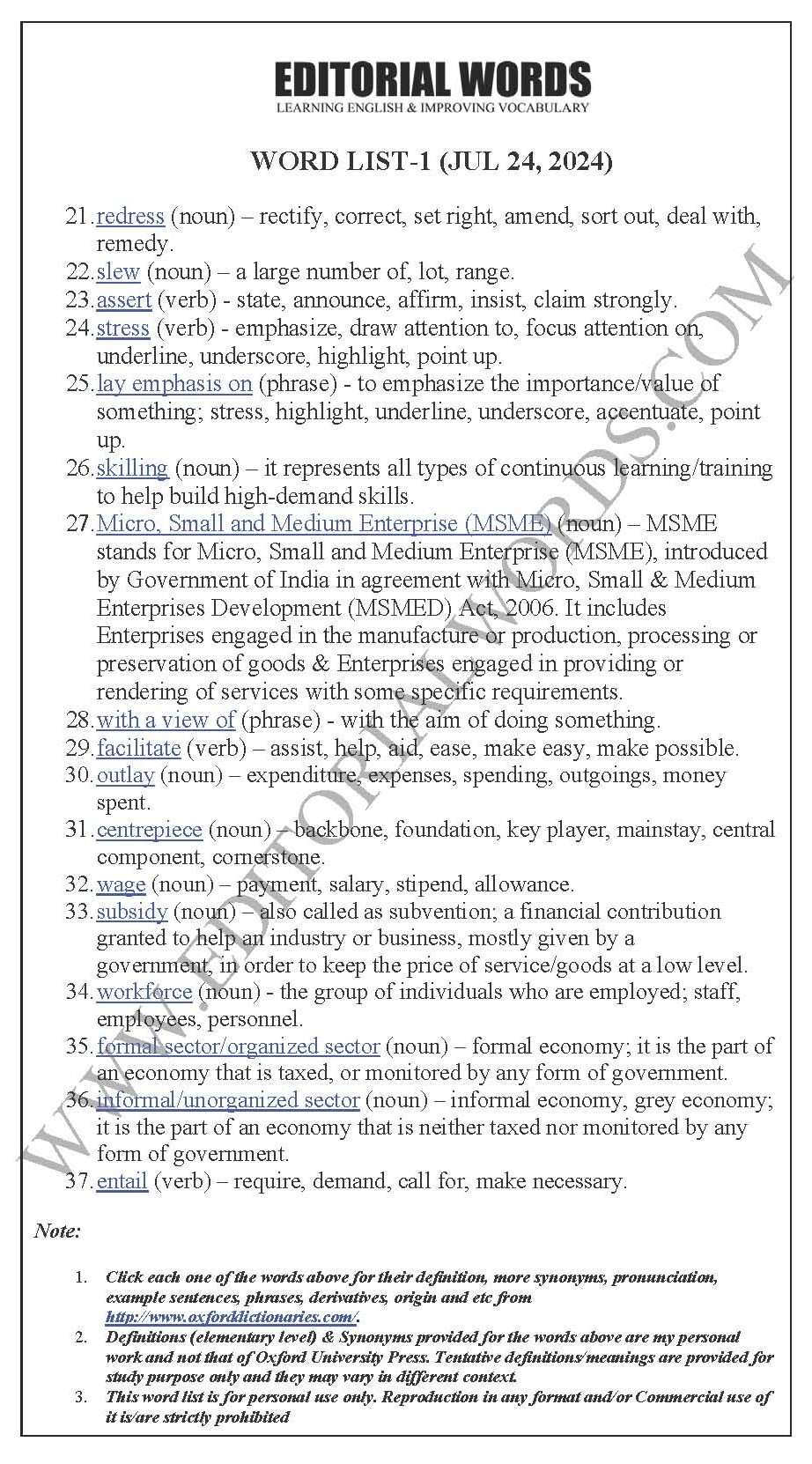
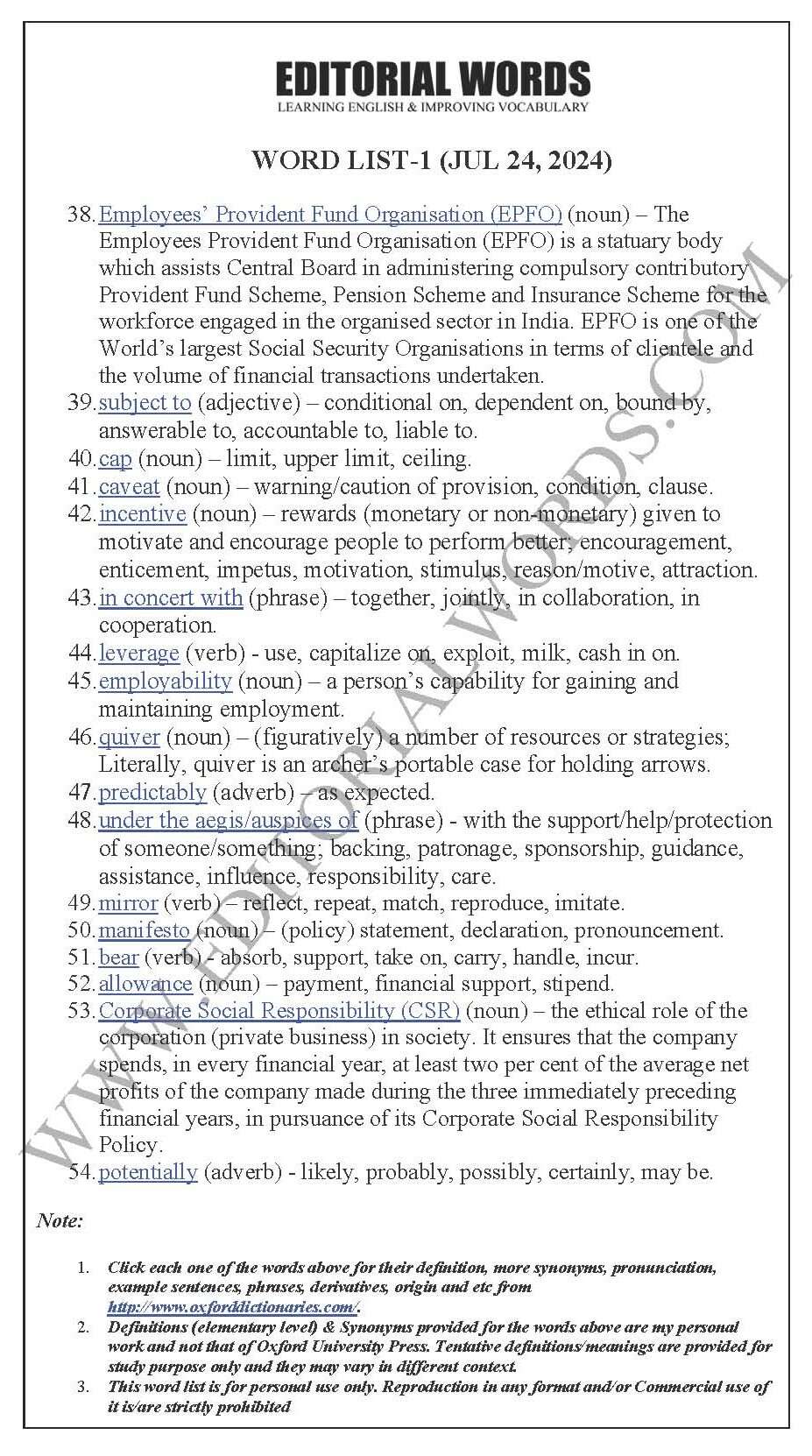
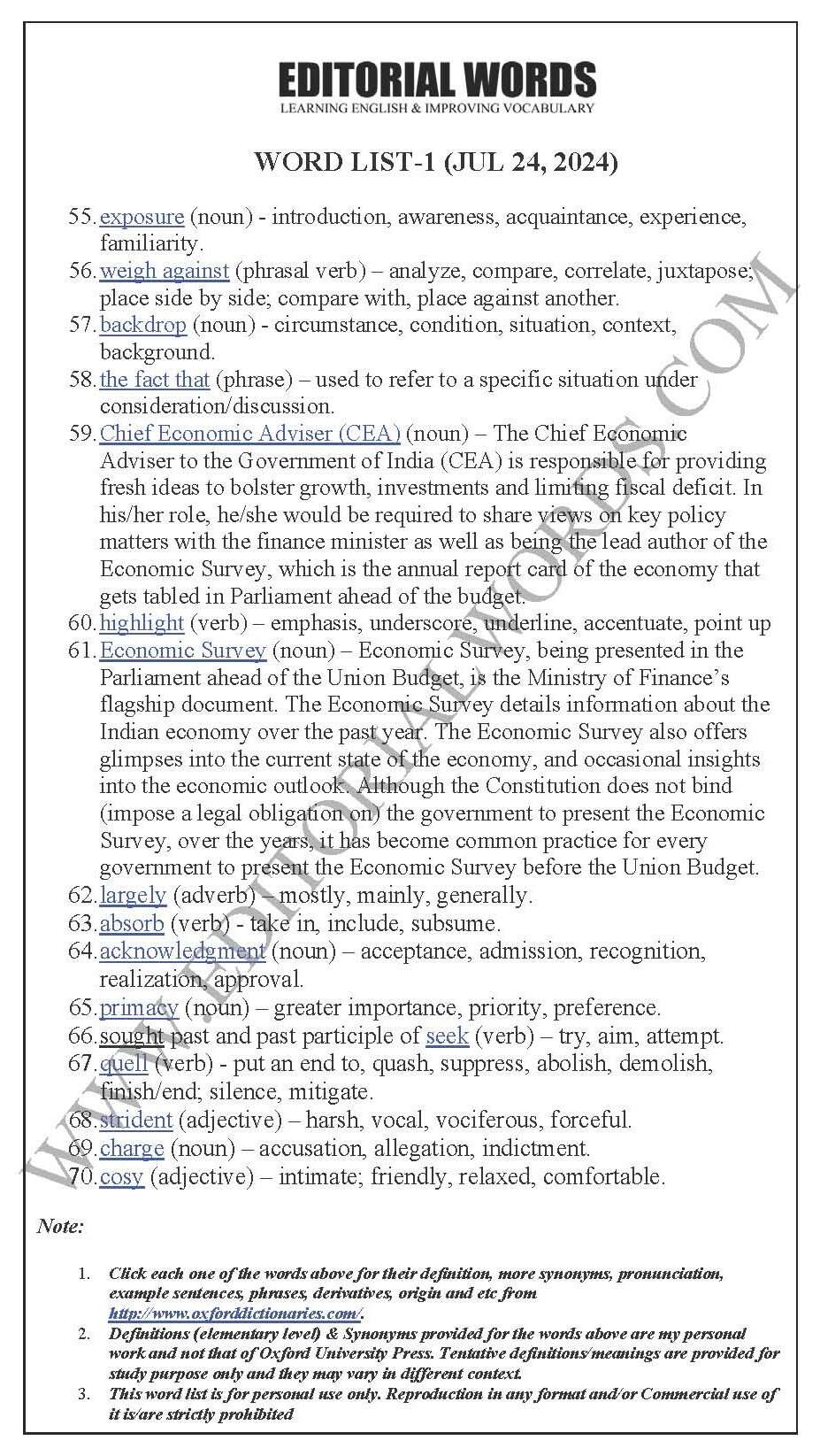
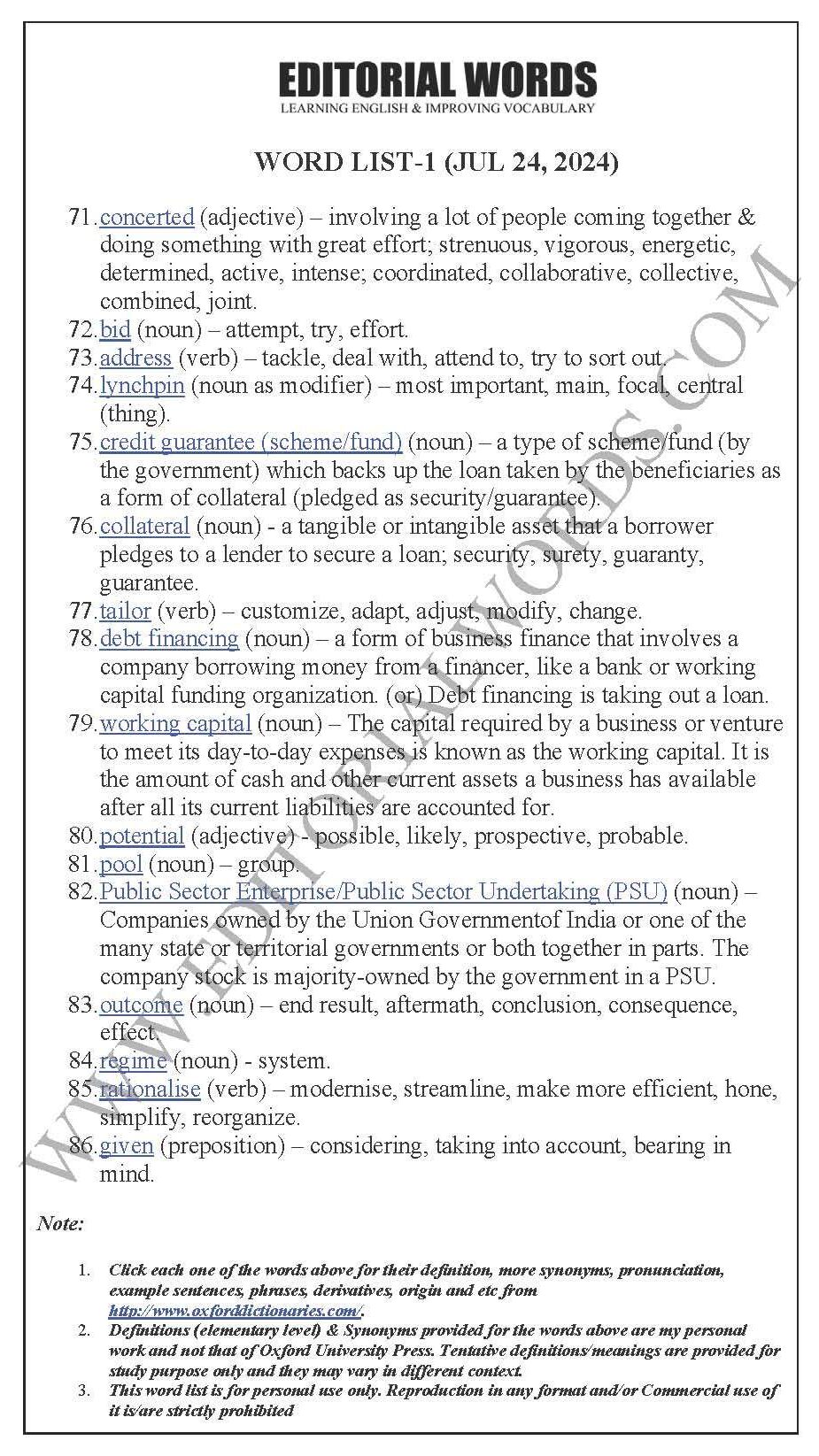
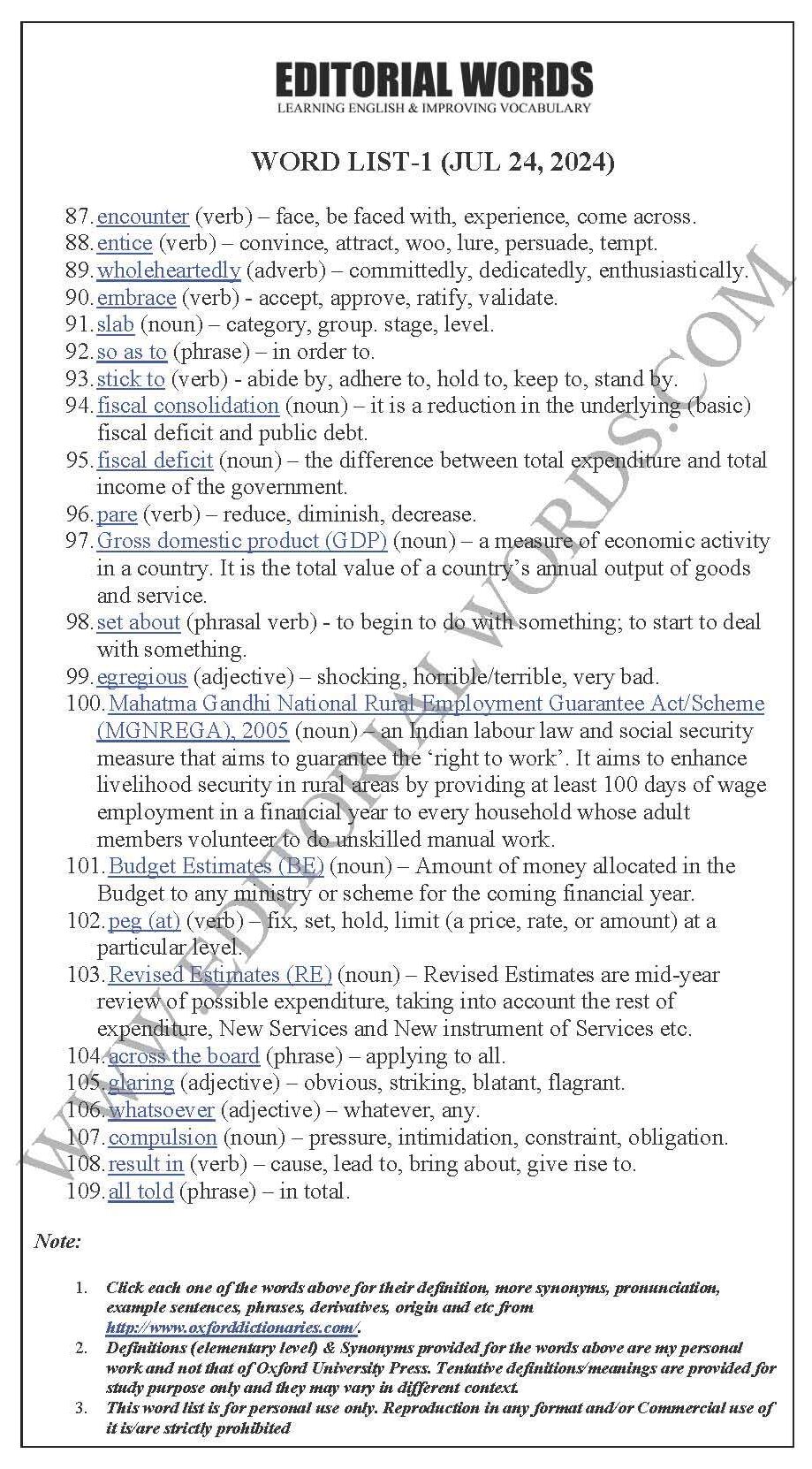
“Phrasal Verbs” We Learnt Last Week
“Idioms & Phrases” We Learnt Last Week
“Important Definitions” We Learnt Last Week
Recent Word Lists For The Hindu Editorial Articles

Finance Minister Nirmala Sitharaman’s first Budget of the BJP-led NDA government’s third consecutive term in power is a distinct attempt to tell India’s voters that… For further reading, visit “The Hindu”. Below is today’s word list-1 for The Hindu Editorial (Shuffling the deck) – Jul 24, 2024.